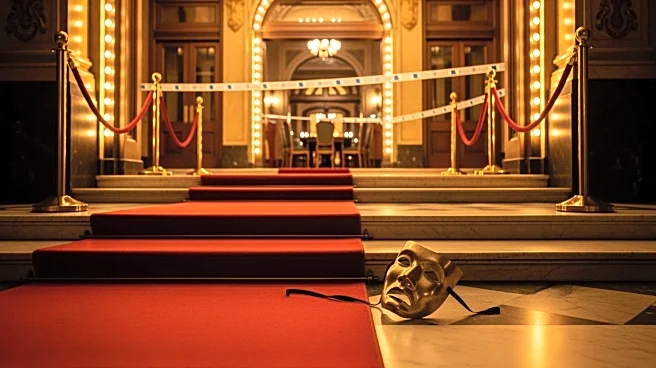What's Happening?
During the Singapore premiere of 'Wicked: For Good,' a fan rushed towards Ariana Grande on the yellow carpet. Cynthia Erivo, who was present at the event, intervened by pushing the man away before security
personnel arrived to handle the situation. The fan, identified as Johnson Wen, also known as 'Pyjama Man,' later posted videos of the incident on Instagram, expressing his excitement at meeting Grande. Wen has a history of similar antics at celebrity events, having previously disrupted performances by artists like Katy Perry and The Weeknd. The incident has sparked criticism from fans, especially considering Grande's past experiences with anxiety and PTSD following the 2017 bombing at her concert in the UK.
Why It's Important?
This incident highlights ongoing concerns about celebrity safety at public events, especially for figures like Ariana Grande who have experienced traumatic events in the past. The actions of the fan not only disrupted the premiere but also posed a potential risk to Grande and other attendees. Such occurrences raise questions about security measures at high-profile events and the need for increased vigilance to protect celebrities from unwanted advances. The backlash from fans underscores the importance of respecting personal boundaries and the impact of such disruptions on both the celebrities involved and their supporters.
What's Next?
Following the incident, there may be increased scrutiny on security protocols at celebrity events to prevent similar occurrences. Event organizers and security teams might consider implementing stricter measures to ensure the safety of attendees and performers. Additionally, the fan's actions could lead to legal consequences, as rushing a celebrity at a public event can be considered a breach of peace or even assault. The incident may also prompt discussions within the entertainment industry about how to better protect artists from overzealous fans.
Beyond the Headlines
The incident at the 'Wicked' premiere reflects broader societal issues regarding the behavior of fans and the boundaries of celebrity interactions. It raises ethical questions about the responsibility of fans to respect the personal space of public figures and the consequences of failing to do so. The event also highlights the cultural phenomenon of 'stage-crashing' and its implications for both celebrities and event organizers. As social media continues to play a role in amplifying such incidents, there may be a need for platforms to address the promotion of disruptive behavior.










